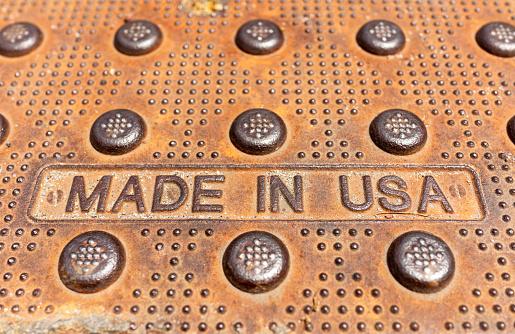Contributing Writer
- FMA
- The Fabricator
- FABTECH
- Canadian Metalworking
Categories
- Additive Manufacturing
- Aluminum Welding
- Arc Welding
- Assembly and Joining
- Automation and Robotics
- Bending and Forming
- Consumables
- Cutting and Weld Prep
- Electric Vehicles
- En Español
- Finishing
- Hydroforming
- Laser Cutting
- Laser Welding
- Machining
- Manufacturing Software
- Materials Handling
- Metals/Materials
- Oxyfuel Cutting
- Plasma Cutting
- Power Tools
- Punching and Other Holemaking
- Roll Forming
- Safety
- Sawing
- Shearing
- Shop Management
- Testing and Measuring
- Tube and Pipe Fabrication
- Tube and Pipe Production
- Waterjet Cutting
Industry Directory
Webcasts
Podcasts
FAB 40
Advertise
Subscribe
Account Login
Search
“Buy American” rules more significant for metal fabricators
Companies planning to sell metal products to the government pretty much have to source from domestic mills
- By Stephen Barlas
- March 15, 2021

If a metal fabricator is looking to sell metal products to a agency of the federal government, the shop is likely going to have to use metal from a domestic source.
While President Joe Biden’s Made in America executive order was devoid of many specifics, except for the establishment of a new vetting office in the White House, the implementation of President Donald Trump’s Made in America executive order on Feb. 22 was much more significant for the metal fabrication industry.
The Department of Defense (DoD), General Services Administration, and National Aeronautics and Space Administration jointly issued final rules on Trump’s EO 13881, and they will have a significant bite on U.S. metal product manufacturers selling to federal agencies where the Buy American Act (BAA) comes into play. Iron and steel products now will have to contain 95% domestic steel inputs, up from 50%.
That new 95% requirement applies to everything except for commercial-off-the-shelf (COTS) fasteners (nuts, bolts, pins, rivets, nails, and screws). The Industrial Fasteners Institute had tried to convince the Trump administration to include COTS fasteners in the 95% edict because U.S. fastener manufacturers have no trouble meeting the 95% requirement, but the government officials declined to do so, mostly because those products are so inexpensive. So no domestic content requirement will be applied to COTS fasteners sold to federal agencies.
The new BAA 95% iron and steel content requirement has been around previously but only applied to certain Federal Transit Administration and Federal Highway Administration grant programs. But for metal fabricators selling to the DoD or other federal agencies, this means that the previous 50% domestic content requirement in the BAA has just been increased 45 percentage points.
“That may not be economically feasible, and even it if is, it may not be possible before the date on which these new rules will be incorporated into solicitations and resulting contracts,” explained Richard W. Arnholt, a federal procurement expert at the law firm Bass Berry & Sims.
After the proposed rule was issued by the three federal agencies in July 2019, Lori Lange, a Washington lawyer representing a fabrication company, wrote on Nov. 13: “Given the fact that our client’s product lines contain highly technical, specialized components, our client anticipates that it will have difficulty locating a U.S. supplier who can comply with the proposed rule. Our client further anticipates that it may take years of reengineering, quality testing, and fabrication of tools/equipment to be able to produce Buy American compliant products under the proposed rule.” When she was contacted recently, Lange declined to identify the company.
Even when a domestic company does meet the 95% mark, it can lose a sale to a non-BAA compliant customer based on price. The new Trump rule gives a boost to the “price preference,” which comes into play when a product containing foreign steel is bid at a lower price than a similar product using all domestic steel.
Labor Department Cancels Trump Apprenticeship Program
The Biden administration reined in the new Industry-Recognized Apprenticeship Program (IRAP) started by the Trump administration. The program sought to give industry groups such as trade associations more of a role in creating apprenticeship programs that qualify for federal funding.
The Trump program allowed the Labor Department to recognize Standards Recognition Entities (SRE), which in turn vetted and approved IRAPs. The first pairing announced last fall was the National Institute of Metalworking Skills serving as the SRE and approving a metalworking IRAP for Raytheon Technologies. The Biden Labor Department said current SREs and IRAPs would remain operational. However, in announcing a halt in SRE/IRAP designations, Suzi LeVine, principal deputy assistant secretary for the Employment and Training Administration, seemed to indicate that the Biden administration wanted to reorient the current Department of Labor-registered apprenticeship program toward “skills in cutting-edge fields like cybersecurity, green energy, software development, and data science.” She did not mention traditional manufacturing.
subscribe now

The Fabricator is North America's leading magazine for the metal forming and fabricating industry. The magazine delivers the news, technical articles, and case histories that enable fabricators to do their jobs more efficiently. The Fabricator has served the industry since 1970.
start your free subscriptionAbout the Author

Stephen Barlas
- Stay connected from anywhere

Easily access valuable industry resources now with full access to the digital edition of The Fabricator.

Easily access valuable industry resources now with full access to the digital edition of The Welder.

Easily access valuable industry resources now with full access to the digital edition of The Tube and Pipe Journal.
- Podcasting
- Podcast:
- The Fabricator Podcast
- Published:
- 04/16/2024
- Running Time:
- 63:29
In this episode of The Fabricator Podcast, Caleb Chamberlain, co-founder and CEO of OSH Cut, discusses his company’s...
- Trending Articles
Capturing, recording equipment inspection data for FMEA

Tips for creating sheet metal tubes with perforations

Are two heads better than one in fiber laser cutting?

Supporting the metal fabricating industry through FMA

Omco Solar opens second Alabama manufacturing facility

- Industry Events
16th Annual Safety Conference
- April 30 - May 1, 2024
- Elgin,
Pipe and Tube Conference
- May 21 - 22, 2024
- Omaha, NE
World-Class Roll Forming Workshop
- June 5 - 6, 2024
- Louisville, KY
Advanced Laser Application Workshop
- June 25 - 27, 2024
- Novi, MI


























